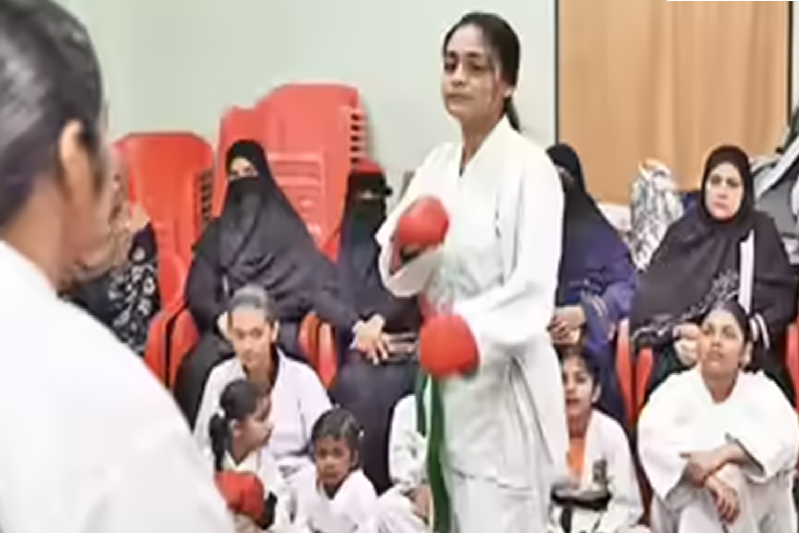
Teen Karate Champion from Mumbai Breaks Barriers and Stereotypes with Asia Cup Gold
In a modest karate training hall inside Nagpada Neighbourhood House NGO in Mumbai, one teenager’s sharp punches and swift footwork command immediate attention. Akku Sarah Shabbir, a 15-year-old karate student and Class 11 commerce student at Maharashtra College, has become a symbol of pride for her community after winning gold medals at both the District Sports Organisation (DSO) competition and the Asia Cup held at Andheri Sports Complex.
Organised by the Asian Shito-Ryu Sports Karate-Do Association, the Asia Cup saw participation from countries like India, Sri Lanka, Nepal, and Malaysia. Sarah clinched her gold by defeating a tough Sri Lankan opponent—solidifying her status as a rising star in the sport.
A Champion in the Making
Sarah’s achievements have made her a mini-celebrity not just in her karate club, but also in her college and in the Mumbai Central neighbourhood, where she lives with her family. Despite following a traditional lifestyle—wearing a hijab like most girls in her community when outdoors—Sarah is clear-eyed and focused about her sporting ambitions.
"My family, friends, and neighbours are happy I got gold medals in back-to-back competitions," said Sarah, modest about her success but aware of its growing significance.
Her father, Shabbir Akku, a perfumer by profession, has supported her from the beginning. "We are religious, but I didn’t stop Sarah when she said she wanted to join a karate club," he said, highlighting a shift in perception among parents in conservative communities.
Breaking Stereotypes and Inspiring Change
Sarah’s achievement has stirred conversations and pride within her community and beyond. Congress MLA Amin Patel, who recently felicitated her, emphasised the broader social impact:
"Muslims are often blamed for not encouraging their daughters to go out and make a career in games and sports. Sarah’s success punctures this stereotype. We will do whatever we can to encourage such budding sporting talents."
For many community leaders, Sarah’s story is about more than just sport. Asif Farooqui, Congress general secretary and a court member at Aligarh Muslim University and Jamia Millia Islamia, expressed how symbolic her victory is:
"This young girl from Mumbai Central has made us all proud with her achievement in Karate. Her dedication and spirit are truly inspiring. The world is changing fast—our girls see everything happening around them and are becoming more aware, strong, and determined. It’s wonderful to see this new confidence, especially among Muslim girls, who are proving that with opportunity and encouragement, they can shine in every sphere."
The Coach Behind the Confidence
Sarah’s journey wouldn’t be possible without the guidance of her coach, Salahuddin Khan, who has been instrumental in training hundreds of students—many of them girls—from 25 different schools across the city.
Khan sees Sarah as part of a larger transformation happening in traditionally conservative pockets:
"I train students at 25 schools and the majority of my students are Muslim girls. I see a positive change in the attitude of parents. They are increasingly aware of the benefits of Karate and why girls need to learn it."
He also credited Shama Taraporewala, the former principal of an Anjuman-I-Islam school, for supporting and encouraging students to take up martial arts and other empowering activities.
Karate as a Tool for Empowerment
For Sarah, karate isn’t just about medals—it’s about self-confidence and safety. “Earlier, I was a bit timid and shy to converse with strangers. Now, I am confident of tackling anyone who tries to misbehave with me,” she shared, showing just how transformative the discipline has been in her life.
Her words reflect a growing realisation among girls and their families about the practical benefits of martial arts, especially in urban settings where issues of safety and harassment are real concerns.
Looking Ahead
With gold medals already to her name and community support backing her, Sarah’s future looks promising—not just as an athlete, but as a role model for young girls across India. Her journey from a shy teenager to an Asia Cup champion is a story of resilience, cultural balance, and empowerment through sport.
As more girls like Sarah step onto the mat and into the limelight, they are not just winning matches—they are shattering outdated narratives, proving that faith, tradition, and ambition can coexist, and that every girl deserves the chance to dream—and fight—for her future.


